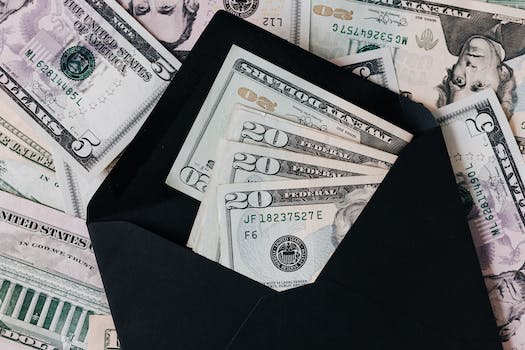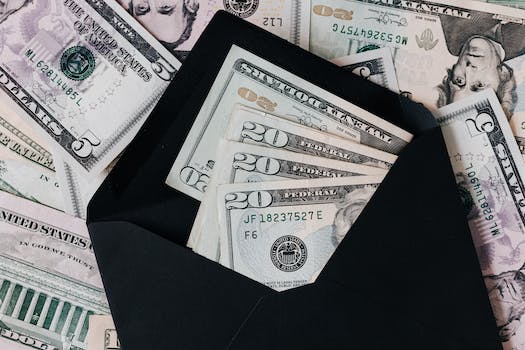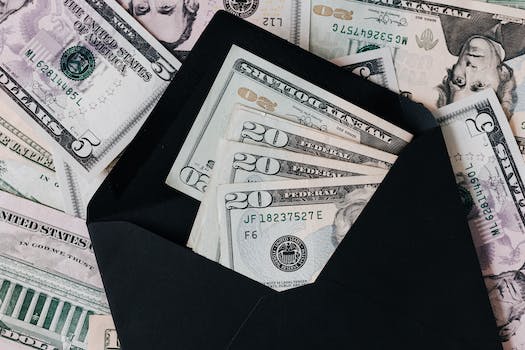How To Save Money During High Inflation
Introduction


Inflation is a common economic phenomenon that affects the prices of goods and services. During high inflation, the cost of living increases, and it becomes challenging to save money. However, there are several ways to save money during high inflation. In this article, we will discuss some practical tips that can help you save money and maintain your financial stability during inflation.
Creating a Budget Plan
Inflation is a term that refers to the increase in the prices of goods and services over time. When inflation is high, it can be challenging to save money. However, with a little bit of planning and discipline, it is possible to save money even during high inflation. One of the most effective ways to do this is by creating a budget plan.
A budget plan is a financial plan that outlines your income and expenses. It helps you to track your spending and identify areas where you can cut back. To create a budget plan, you need to start by listing all your sources of income. This includes your salary, any bonuses, and any other sources of income you may have.
Next, you need to list all your expenses. This includes your rent or mortgage payments, utilities, groceries, transportation, and any other expenses you have. Once you have listed all your expenses, you need to categorize them into fixed and variable expenses.
Fixed expenses are expenses that remain the same every month, such as rent or mortgage payments. Variable expenses are expenses that can change from month to month, such as groceries or entertainment. Once you have categorized your expenses, you need to add up your total income and total expenses.
If your total expenses are higher than your total income, you need to find ways to cut back on your expenses. This could mean cutting back on eating out, reducing your entertainment expenses, or finding ways to save on your utilities. You could also consider finding ways to increase your income, such as taking on a part-time job or selling items you no longer need.
Once you have created your budget plan, it is important to stick to it. This means tracking your spending and making adjustments as needed. You should also review your budget plan regularly to ensure that it is still working for you.
In addition to creating a budget plan, there are other ways to save money during high inflation. One of the most effective ways is to shop around for the best deals. This means comparing prices at different stores and looking for coupons and discounts.
You can also save money by buying in bulk. This is especially true for items that you use frequently, such as toilet paper or laundry detergent. Buying in bulk can help you save money in the long run, as you will be paying less per unit.
Another way to save money during high inflation is to reduce your debt. This means paying off any credit card debt or loans as quickly as possible. The longer you carry debt, the more interest you will pay, which can add up over time.
Finally, it is important to prioritize your spending. This means focusing on the things that are most important to you and cutting back on the things that are not. For example, if you value travel, you may want to cut back on eating out or entertainment expenses to save money for your next trip.
In conclusion, saving money during high inflation requires discipline and planning. Creating a budget plan is one of the most effective ways to save money, as it helps you to track your spending and identify areas where you can cut back. In addition to creating a budget plan, you can also save money by shopping around for the best deals, buying in bulk, reducing your debt, and prioritizing your spending. With a little bit of effort, it is possible to save money even during high inflation.
Cutting Back on Unnecessary Expenses
Inflation is a term that we hear quite often, but what does it really mean? Inflation is the rate at which the general level of prices for goods and services is rising, and as a result, the purchasing power of currency is decreasing. Inflation can have a significant impact on our finances, and it’s important to know how to save money during high inflation.
One of the most effective ways to save money during high inflation is to cut back on unnecessary expenses. This may seem like a no-brainer, but it’s surprising how many people overlook this simple solution. Cutting back on unnecessary expenses doesn’t mean that you have to live like a hermit, but it does mean that you need to be more mindful of your spending habits.
One of the first things you can do is to take a look at your monthly bills. Are there any services that you’re paying for that you don’t really need? For example, do you really need that premium cable package or that gym membership that you never use? Canceling these services can save you a significant amount of money each month.
Another way to cut back on unnecessary expenses is to take a closer look at your grocery bill. Are you buying expensive brand-name products when there are cheaper alternatives available? Are you throwing away food that has gone bad because you bought too much? By making a few simple changes to your grocery shopping habits, you can save a lot of money each month.
Eating out is another area where many people overspend. While it’s nice to go out to eat once in a while, it can be a real drain on your finances if you’re doing it too often. Instead of eating out, try cooking at home more often. Not only is it cheaper, but it’s also healthier.
If you’re a big spender when it comes to entertainment, there are ways to cut back on those expenses as well. Instead of going to the movies or a concert, try renting a movie or streaming one online. You can also look for free events in your community, such as concerts in the park or art exhibits.
Finally, take a look at your transportation expenses. Are you driving a car that’s too expensive to maintain? Could you save money by taking public transportation or carpooling with coworkers? By making a few changes to your transportation habits, you can save a lot of money each month.
In conclusion, cutting back on unnecessary expenses is one of the most effective ways to save money during high inflation. By taking a closer look at your monthly bills, grocery shopping habits, entertainment expenses, and transportation costs, you can identify areas where you can cut back and save money. While it may require some sacrifice and lifestyle changes, the long-term benefits of saving money during high inflation are well worth it. So, take a closer look at your spending habits and start cutting back today!
Shopping Smart: Using Coupons and Sales
Inflation can be a real pain in the wallet. Prices for goods and services can skyrocket, leaving many people struggling to make ends meet. However, there are ways to save money during high inflation, and one of the best ways is by shopping smart. By using coupons and taking advantage of sales, you can stretch your dollars further and keep more money in your pocket.
Coupons are a great way to save money on everyday purchases. They can be found in newspapers, magazines, and online. Many stores also offer their own coupons, which can be found on their websites or in their weekly ads. By using coupons, you can save anywhere from a few cents to several dollars on each item you purchase.
To get the most out of your coupons, it’s important to be organized. Keep your coupons in a folder or binder, and make sure they are sorted by expiration date. This will help you avoid letting coupons expire before you have a chance to use them. It’s also a good idea to check the store’s coupon policy before you go shopping. Some stores may limit the number of coupons you can use per transaction, or they may not accept certain types of coupons.
Another way to save money during high inflation is by taking advantage of sales. Many stores offer weekly or monthly sales on certain items, and these sales can be a great way to save money. Look for items that you use regularly, and stock up when they are on sale. This can help you avoid paying full price when prices go up.
It’s also a good idea to compare prices between different stores. Just because an item is on sale at one store doesn’t mean it’s the best deal. Take the time to compare prices at different stores, and don’t be afraid to shop around. You may be surprised at how much you can save by shopping at a different store.
In addition to coupons and sales, there are other ways to save money when shopping. One way is to buy in bulk. Many stores offer discounts on bulk purchases, and this can be a great way to save money on items you use regularly. Just make sure you have enough storage space for your bulk purchases.
Another way to save money is by buying generic or store-brand items. These items are often just as good as name-brand items, but they are usually much cheaper. Don’t be afraid to try store-brand items, especially if you are on a tight budget.
Finally, it’s important to be mindful of your spending habits. Avoid impulse purchases, and only buy what you need. Make a list before you go shopping, and stick to it. This can help you avoid overspending and keep your budget on track.
In conclusion, shopping smart is a great way to save money during high inflation. By using coupons, taking advantage of sales, buying in bulk, and being mindful of your spending habits, you can stretch your dollars further and keep more money in your pocket. So the next time you go shopping, remember to shop smart and save money.
Investing in High-Yield Savings Accounts
Inflation is a term that we hear quite often, but do we really understand what it means? Inflation is the rate at which the general level of prices for goods and services is rising, and it can have a significant impact on our finances. When inflation is high, the cost of living increases, and our purchasing power decreases. This can make it challenging to save money and achieve our financial goals. However, there are ways to combat high inflation and save money. One of the most effective ways is by investing in high-yield savings accounts.
High-yield savings accounts are a type of savings account that offers a higher interest rate than traditional savings accounts. These accounts are typically offered by online banks and credit unions and are FDIC-insured, which means that your money is protected up to $250,000. The interest rates on high-yield savings accounts can vary, but they are generally much higher than the rates offered by traditional savings accounts.
Investing in a high-yield savings account can be an excellent way to save money during high inflation. When inflation is high, the value of money decreases, and the cost of goods and services increases. This means that the interest rate on traditional savings accounts may not keep up with inflation, and your money may lose value over time. However, high-yield savings accounts offer a higher interest rate, which can help your money keep up with inflation and maintain its value.
Another benefit of investing in a high-yield savings account is that they are low-risk investments. Unlike stocks and other investments, high-yield savings accounts are not subject to market fluctuations and are not affected by economic downturns. This means that your money is safe and secure, and you can be confident that it will be there when you need it.
When choosing a high-yield savings account, it is essential to do your research and compare rates and fees. Some high-yield savings accounts may have minimum balance requirements or monthly fees, so it is important to read the fine print before opening an account. Additionally, it is important to consider the accessibility of your money. Some high-yield savings accounts may have restrictions on withdrawals or transfers, so it is important to choose an account that meets your needs.
In conclusion, investing in a high-yield savings account can be an effective way to save money during high inflation. These accounts offer a higher interest rate than traditional savings accounts and are low-risk investments. However, it is important to do your research and choose an account that meets your needs. By investing in a high-yield savings account, you can protect your money from inflation and achieve your financial goals.
Reducing Debt and Interest Payments
Inflation can be a challenging time for anyone, especially when it comes to managing finances. With prices rising, it can be difficult to keep up with expenses and maintain a healthy financial situation. However, there are ways to save money during high inflation, and one of the most effective methods is by reducing debt and interest payments.
Debt can be a significant burden during inflation, as the interest rates on loans and credit cards can increase, making it harder to pay off the debt. One way to reduce debt is by consolidating it into a single loan with a lower interest rate. This can be done by taking out a personal loan or using a balance transfer credit card. By consolidating debt, you can save money on interest payments and make it easier to manage your finances.
Another way to reduce debt is by prioritizing payments. If you have multiple debts, focus on paying off the ones with the highest interest rates first. This will help you save money in the long run and reduce the overall amount of debt you have. Additionally, consider negotiating with creditors to lower interest rates or payment plans that work better for your financial situation.
Credit cards can also be a significant source of debt during inflation. To save money, consider using cash or a debit card instead of credit cards. This will help you avoid interest payments and keep your spending in check. If you do use credit cards, make sure to pay off the balance in full each month to avoid accumulating debt.
In addition to reducing debt, there are other ways to save money on interest payments during inflation. One way is by refinancing loans or mortgages. If interest rates have decreased since you took out a loan, consider refinancing to get a lower rate. This can help you save money on interest payments and reduce the overall cost of the loan.
Another way to save money on interest payments is by negotiating with lenders. If you have a good credit score and a history of on-time payments, you may be able to negotiate a lower interest rate on loans or credit cards. This can help you save money and make it easier to manage your finances during inflation.
Finally, consider using savings to pay off debt or make larger payments on loans. While it may be tempting to hold onto savings during inflation, using them to pay off debt can help you save money on interest payments and reduce the overall amount of debt you have. Additionally, making larger payments on loans can help you pay them off faster and save money on interest payments.
In conclusion, reducing debt and interest payments is an effective way to save money during high inflation. By consolidating debt, prioritizing payments, using cash or debit cards, refinancing loans, negotiating with lenders, and using savings to pay off debt, you can reduce the financial burden of inflation and maintain a healthy financial situation. Remember to always prioritize your financial well-being and make informed decisions when managing your finances during inflation.
Earning Extra Income through Side Hustles
Inflation can be a real pain in the wallet. It can make everything from groceries to gas more expensive, leaving you with less money to spend on the things you really want or need. But there are ways to combat high inflation and save money, and one of those ways is by earning extra income through side hustles.
A side hustle is a way to make money outside of your regular job. It can be anything from selling handmade crafts on Etsy to driving for Uber or Lyft. The key is to find something that you enjoy doing and that can bring in some extra cash.
One popular side hustle is freelancing. If you have a skill like writing, graphic design, or web development, you can offer your services to clients on a freelance basis. Websites like Upwork and Fiverr make it easy to find clients and get paid for your work.
Another option is to start a small business. This could be anything from a lawn care service to a pet-sitting business. The key is to find a need in your community and fill it. You can advertise your services on social media or through word of mouth, and before you know it, you could have a thriving business on your hands.
If you’re not interested in starting your own business or freelancing, there are still plenty of other side hustles you can try. You could sell items on eBay or Amazon, participate in paid surveys, or even rent out a spare room on Airbnb.
The great thing about side hustles is that they can be done in your spare time, so you don’t have to sacrifice your regular job or family time to make some extra money. And with the rise of the gig economy, there are more opportunities than ever to earn extra income.
Of course, earning extra income through side hustles isn’t a magic solution to high inflation. You still need to be smart with your money and make a budget that works for you. But having that extra income can make a big difference, especially if you’re struggling to make ends meet.
So if you’re looking for ways to save money during high inflation, consider starting a side hustle. It may take some time and effort to get started, but the rewards can be well worth it. Not only will you have more money in your pocket, but you’ll also have the satisfaction of knowing that you’re taking control of your finances and making a positive change in your life.
Preparing for Emergencies with an Emergency Fund
Inflation is a term that we hear often, but many of us don’t fully understand what it means. Inflation is the rate at which the general level of prices for goods and services is rising, and it can have a significant impact on our finances. When inflation is high, the cost of living increases, and our purchasing power decreases. This can make it challenging to save money and plan for the future. However, there are steps you can take to prepare for high inflation and save money.
One of the most important steps you can take is to establish an emergency fund. An emergency fund is a savings account that you set aside for unexpected expenses or emergencies. This fund can help you cover unexpected expenses, such as car repairs, medical bills, or home repairs, without having to rely on credit cards or loans. Having an emergency fund can also help you avoid dipping into your long-term savings, such as your retirement account, to cover unexpected expenses.
To establish an emergency fund, you should start by setting a savings goal. A good rule of thumb is to save three to six months’ worth of living expenses. This means that if your monthly expenses are $3,000, you should aim to save between $9,000 and $18,000. This may seem like a lot of money, but it’s important to remember that an emergency fund is meant to be a safety net, and it can take time to build up.
Once you have set your savings goal, you should start saving regularly. You can do this by setting up automatic transfers from your checking account to your savings account. This will help you stay on track with your savings goal and make it easier to save consistently. You should also look for ways to cut back on expenses and redirect that money towards your emergency fund. This could mean cutting back on eating out, canceling subscriptions you don’t use, or finding ways to save on your monthly bills.
Another important aspect of preparing for emergencies is to have a plan in place for unexpected events. This could include having insurance to cover unexpected medical expenses or home repairs, or having a plan for what to do in the event of a job loss. Having a plan in place can help you feel more prepared and less stressed in the event of an emergency.
In addition to establishing an emergency fund, there are other steps you can take to save money during high inflation. One of the most effective ways to save money is to be mindful of your spending. This means tracking your expenses and looking for ways to cut back on unnecessary purchases. You should also look for ways to save on your monthly bills, such as negotiating with your service providers or switching to a cheaper plan.
Another way to save money during high inflation is to invest in assets that are likely to appreciate in value. This could include stocks, real estate, or precious metals. While these investments carry some risk, they can provide a hedge against inflation and help you grow your wealth over time.
In conclusion, high inflation can make it challenging to save money and plan for the future. However, by establishing an emergency fund and being mindful of your spending, you can take steps to prepare for unexpected expenses and save money. Remember, building an emergency fund takes time, but it’s an important step in securing your financial future. By taking these steps, you can feel more confident and prepared in the face of inflation and other financial challenges.
Conclusion
Conclusion: To save money during high inflation, it is important to prioritize needs over wants, reduce unnecessary expenses, invest in assets that appreciate in value, and consider alternative sources of income. It is also important to stay informed about the current economic situation and adjust financial strategies accordingly. By implementing these strategies, individuals can protect their finances and maintain their purchasing power during times of high inflation.






